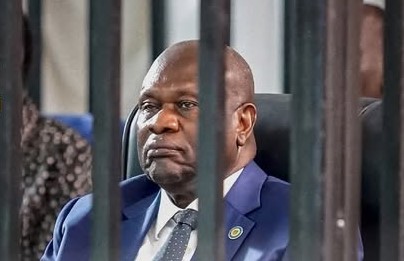Before delving into the substance of the case, it is important to recall one of the simplest legal principles taught to first-year law students: the principle of jurisdiction. No court may hear a case before establishing that it is competent in terms of subject matter, place, and person. Yet what we see today in Juba reveals a profound ignorance of this foundational principle among some legal practitioners and scholars. Grave accusations are leveled against political figures without first determining whether the court even has the authority to adjudicate. Here, law is reduced to mere decoration displayed in the Freedom Hall, while political decision-making is the true arbiter of the trial’s course.
Against this backdrop, one must ask a legitimate question: What exactly does Salva Kiir seek from this trial?
The answer is not justice, but politics. The president wants Riek Machar politically alive yet incapacitated—permanently accused but never convicted, formally present in government but effectively absent from influence. He does not wish to eliminate him entirely, lest this create space for a more dangerous rival, nor does he wish to grant him real room to reemerge as a political actor. It is the tactic of keeping one’s opponent in the “gray zone”: neither politically dead nor fully alive.
At its core, Kiir’s maneuver through this trial seeks to achieve several objectives:
• Weakening Machar without outright exclusion: ensuring he remains visible but neutralized, a lesson for others who may aspire to succeed Kiir.
• Turning the judiciary into an instrument of rule: the court becomes a stage to send a message—those who oppose the president will one day stand in the dock.
• Reproducing a narrative of legitimacy: to the outside world, Kiir appears as a statesman submitting his rivals to justice; domestically, he poses as guardian of “legitimacy.”
• Buying time and shaping succession: the trial gives him breathing space to consolidate family and political power without direct pressure from the opposition.
• Deflecting attention from corruption and systemic collapse: while the public is preoccupied with the trial spectacle, the billions looted remain unaccounted for—even as the latest UN report warns of further sanctions on political figures.
Thus, it is naïve to assume that the chief defendant is Dr. Riek Machar or his comrades. The true defendant in this trial is the memory of the peace agreement itself—and the nation at large. An agreement signed under bright lights and celebrated with fanfare has never been implemented beyond speeches and official communiqués.
How can an agreement herald peace and yet become a reference point for political liquidation? How can its texts serve as little more than ceremonial slogans while battlefields and crises never rest? What is being tried today in Juba is not merely political personalities, but the grand illusion that signing equals implementation.
Freedom Hall, meant to symbolize justice and dignity, has been transformed into a theatre for settling old scores among former comrades-in-arms. Here, the peace agreement is invoked as a false witness: constantly mentioned in speeches and documents, yet absent from people’s lives, leaving behind only two recycled words at every occasion—sustainable peace.
The painful irony is that the very signatories of the agreement now stand accused of waging war, while those who obstructed its implementation sit in judgment. This is not justice, but a recycling of the politics of the “perpetual defendant”—where agreements are taken hostage, freedom becomes an empty title, and justice is reduced to a dramatic interlude in an endless play of power.
And yet, despite all this, a glimmer of hope remains. That hope lies with the judiciary itself, where there are still men and women capable of honoring their oath and refusing to be used as props in political theatre. We are not asking the impossible; we are only asking that the courts remain a refuge for the honorable—especially when the innocent are prosecuted and the thieves acquitted, when ordinary citizens are thrown behind bars while those who stole billions are paraded in power’s ceremonies.
It is the duty of judges today to inscribe in history that they stood with justice, not with oppression; that Freedom Hall is not merely a tent with an ironic name, but a beacon from which the true dawn of liberty in South Sudan may yet rise—the day when the burdens on the oppressed and the nation are lifted, and when those who plundered the people are held accountable before those who merely disagreed with the ruler. From Freedom Hall must rise the dawn of freedom—not the burial place of its meaning, nor a monument to injustice and the abuse of law.
The writer, Samuel Peter Oyay, is a South Sudanese political activist, strategist, and commentator with over two decades of experience in governance and management. He can be reached via samualjago@yahoo.com
The views expressed in ‘opinion’ articles published by Radio Tamazuj are solely those of the writer. The veracity of any claims made is the responsibility of the author, not Radio Tamazuj.




